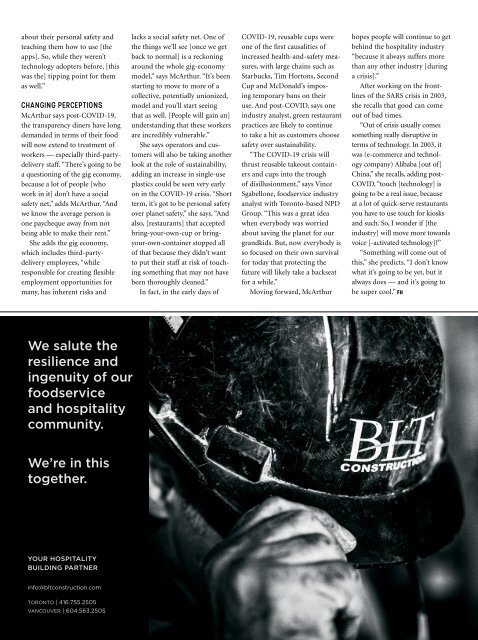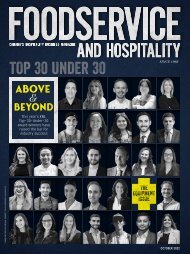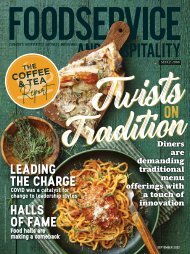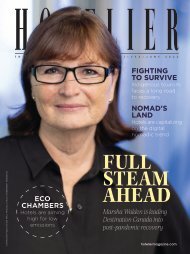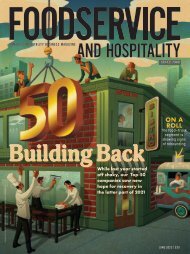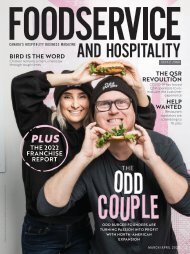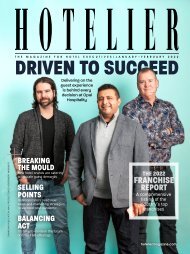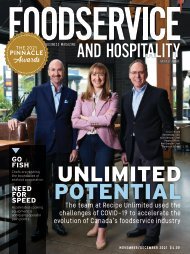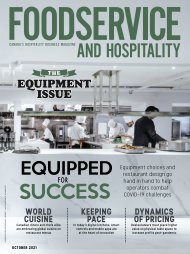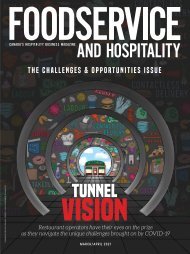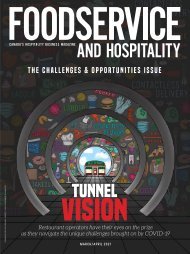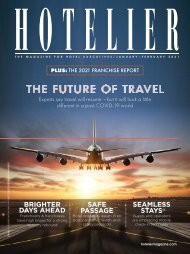May 2020
May 2020 issue of Foodservice and Hospitality magazine.
May 2020 issue of Foodservice and Hospitality magazine.
Create successful ePaper yourself
Turn your PDF publications into a flip-book with our unique Google optimized e-Paper software.
about their personal safety and<br />
teaching them how to use [the<br />
apps]. So, while they weren’t<br />
technology adopters before, [this<br />
was the] tipping point for them<br />
as well.”<br />
CHANGING PERCEPTIONS<br />
McArthur says post-COVID-19,<br />
the transparency diners have long<br />
demanded in terms of their food<br />
will now extend to treatment of<br />
workers — especially third-partydelivery<br />
staff. “There’s going to be<br />
a questioning of the gig economy,<br />
because a lot of people [who<br />
work in it] don’t have a social<br />
safety net,” adds McArthur. “And<br />
we know the average person is<br />
one paycheque away from not<br />
being able to make their rent.”<br />
She adds the gig economy,<br />
which includes third-partydelivery<br />
employees, “while<br />
responsible for creating flexible<br />
employment opportunities for<br />
many, has inherent risks and<br />
lacks a social safety net. One of<br />
the things we’ll see [once we get<br />
back to normal] is a reckoning<br />
around the whole gig-economy<br />
model,” says McArthur. “It’s been<br />
starting to move to more of a<br />
collective, potentially unionized,<br />
model and you’ll start seeing<br />
that as well. [People will gain an]<br />
understanding that these workers<br />
are incredibly vulnerable.”<br />
She says operators and customers<br />
will also be taking another<br />
look at the role of sustainability,<br />
adding an increase in single-use<br />
plastics could be seen very early<br />
on in the COVID-19 crisis. “Short<br />
term, it’s got to be personal safety<br />
over planet safety,” she says. “And<br />
also, [restaurants] that accepted<br />
bring-your-own-cup or bringyour-own-container<br />
stopped all<br />
of that because they didn’t want<br />
to put their staff at risk of touching<br />
something that may not have<br />
been thoroughly cleaned.”<br />
In fact, in the early days of<br />
COVID-19, reusable cups were<br />
one of the first causalities of<br />
increased health-and-safety measures,<br />
with large chains such as<br />
Starbucks, Tim Hortons, Second<br />
Cup and McDonald’s imposing<br />
temporary bans on their<br />
use. And post-COVID, says one<br />
industry analyst, green restaurant<br />
practices are likely to continue<br />
to take a hit as customers choose<br />
safety over sustainability.<br />
“The COVID-19 crisis will<br />
thrust reusable takeout containers<br />
and cups into the trough<br />
of disillusionment,” says Vince<br />
Sgabellone, foodservice industry<br />
analyst with Toronto-based NPD<br />
Group. “This was a great idea<br />
when everybody was worried<br />
about saving the planet for our<br />
grandkids. But, now everybody is<br />
so focused on their own survival<br />
for today that protecting the<br />
future will likely take a backseat<br />
for a while.”<br />
Moving forward, McArthur<br />
hopes people will continue to get<br />
behind the hospitality industry<br />
“because it always suffers more<br />
than any other industry [during<br />
a crisis].”<br />
After working on the frontlines<br />
of the SARS crisis in 2003,<br />
she recalls that good can come<br />
out of bad times.<br />
“Out of crisis usually comes<br />
something really disruptive in<br />
terms of technology. In 2003, it<br />
was (e-commerce and technology<br />
company) Alibaba [out of]<br />
China,” she recalls, adding post-<br />
COVID, “touch [technology] is<br />
going to be a real issue, because<br />
at a lot of quick-serve restaurants<br />
you have to use touch for kiosks<br />
and such. So, I wonder if [the<br />
industry] will move more towards<br />
voice [-activated technology]?”<br />
“Something will come out of<br />
this,” she predicts. “I don’t know<br />
what it’s going to be yet, but it<br />
always does — and it’s going to<br />
be super cool.” FH<br />
We salute the<br />
resilience and<br />
ingenuity of our<br />
foodservice<br />
and hospitality<br />
community.<br />
We’re in this<br />
together.<br />
YOUR HOSPITALITY<br />
BUILDING PARTNER<br />
info@bltconstruction.com<br />
TORONTO | 416.755.2505<br />
VANCOUVER | 604.563.2505<br />
20 FOODSERVICE AND HOSPITALITY MAY <strong>2020</strong> FOODSERVICEANDHOSPITALITY.COM


